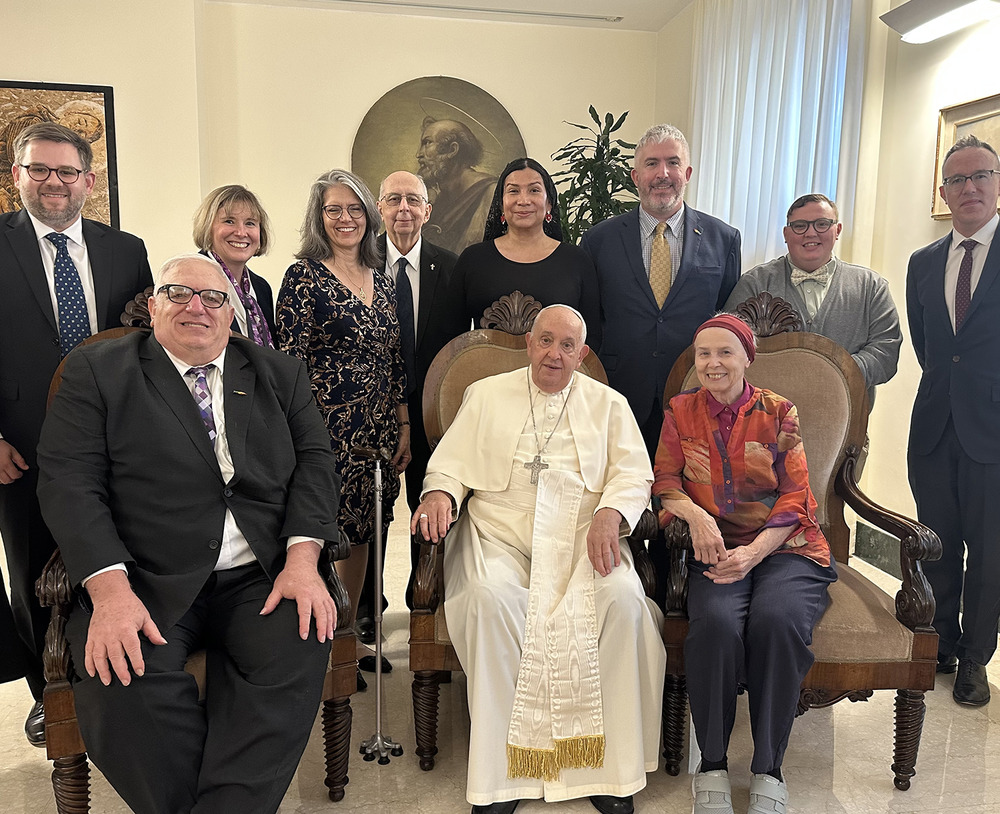
A group of transgender, intersex and ally Catholics gathered for an audience with Pope Francis to discuss the church's position on gender-affirming care. Pictured here: Robert Shine, Francis DeBernardo, Dr. Cynthia Herrick, Laurie Dever, Deacon Raymond Deaver, Nicole Santamaria, Pope Francis, Matthew Myers, Sister Jeannine Gramick, Michael Sennett and Brian Flanagan. (Courtesy, New Ways Ministry)
For the second time in less than a year, Pope Francis met with transgender and intersex Catholics on Sunday (Oct. 13) at the Vatican, where he listened to their stories of pain, solitude and redemption.
Members of the transgender community, a U.S. doctor who provides gender-affirming care, and parents of a transgender daughter who struggled with her gender identity were among the 11 people present at the nearly 90-minute meeting.
"Hormones and surgeries are not just physical transformations. They are holy affirmations of who I am in God’s eyes. I have not interfered with God’s plan for creation. I have simply become more fully the person God created me to be," said Michael Sennett, a transgender man and theology student, in his written remarks at the Vatican.
Sennett told his story of marginalization and suffering as he struggled to define his gender in a Catholic context, but said he found consolation in the words of some clergy who offered welcome and understanding.
Nicole Santamaria, who fled from her family in El Salvador after they beat her for being born intersex, also said her life changed when a Jesuit priest made her feel recognized and worthy. Her parents had decided she was a boy at birth and put her through several surgeries as a baby. She said that as an adult, she’s discovered her identity as a hermaphrodite woman.
"I work with the Trans community because, although it is not my entire experience, I can understand the suffering of expressing your identity and of being excluded, violated, and even exterminated, since I was also forced to be raised in a gender that wasn’t my biological one," she said.
The meeting was arranged by Sister Jeannine Gramick, who has 50 years of experience ministering to the queer community and co-founded New Ways Ministry in 1977 to provide support for LGBTQIA Catholics in the U.S.
Gramick asked to meet with Francis after the Vatican’s doctrinal department issued a declaration in April, "Dignitas Infinita," or Infinite Dignity, which rejected gender-affirming surgery and condemned gender theory as "a concession to the age-old temptation to make oneself God." Gramick wanted the pope to listen to the stories of transgender and intersex Catholics, according to a statement by New Ways Ministry.
Advertisement
"I recognize the concerns of the church with gender theory, but we have learned that there simply is no connection between gender theory and transgender individuals, people who struggle with gender dysphoria as defined by the medical profession, something that clearly is not a personal choice or the result of some ideology," said Deacon Raymond Dever and his wife, Laurie, in their speeches to the pope.
The pastoral ministers struggled for 10 years to help their transgender daughter, who attempted suicide as she underwent her difficult transition. Raymond Dever said he was struck by "the stunning lack of compassion within so much of the church for transgender people," and he urged the church to rethink the way it relates to these issues.
Citing statistics in the U.S. for transgender individuals, Cynthia Herrick, co-director of a gender medicine clinic, said gender-affirming surgeries have a profound impact on people’s well-being. "Numerous patients have told me this care saved their lives," she said.
Pope Francis listened to the stories "with very pained looks when people described any moments of suffering that they went through. He would clutch his pectoral cross and his face looked visibly disturbed," said Francis DeBernardo, the executive director of New Ways Ministry, in an interview with RNS on Monday.
DeBernardo said the pope also looked "very pleased" when he heard the stories of redemption and the positive impact of gender transition. "He kept repeating that we, meaning the church, have to think of the individual person," he said.
At the end of the meeting, Gramick urged the pope to rethink the Vatican’s stance on gender and said the head of its doctrinal department should also listen to the stories of LGBTQIA Catholics, DeBernardo said.
"The group urged Pope Francis to move past the Church’s negative approach to gender-diverse people, and to encourage Church leaders to listen more attentively to the lives and faith of LGBTQ+ people," the New Ways Ministry statement read.
This was the second meeting New Ways Ministry staff had with the pope, the first one taking place on Oct. 17 of last year. Francis has shown personal openness and welcoming toward LGBTQIA Catholics but has avoided changing church teaching on homosexuality or gender.
"I think it’s Pope Francis’ style to model behavior rather than make statements," DeBernardo said.







